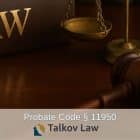Property Dispute Resolution With Zero Upfront Cost
Partition Attorneys in Tustin, Garden Grove, and Orange
When co-owners in Santa Ana cannot agree on what to do with their shared property, the law provides a clear solution: partition. At Talkov Law, we specialize in partition actions in California, leveraging our extensive experience in real estate law and local property regulations to protect your rights and unlock your equity.
- Zero Partitions Denied
- 500+ Partition Cases Filed
- Most Cases Resolved in Under 7 Months
- Qualified Cases May Pay at the End; Monthly Billing Also Available
Call Now at (714) 888-7700

Take Control—Next Steps to Solve Your Partition Dispute
Guided by our experienced partition attorneys, you’ll move through each step while we shoulder the legal complexities.
Co-Ownership Conflict? Not Anymore.
Most co-ownership disputes are settled in under 7 months, and you pay no upfront costs.
At Talkov Law, our partition attorneys have helped hundreds resolve their disputes—we’re the only California firm devoted entirely to partition actions.
Set Up a Free Consultation
Protect your property interests with guidance from our attorneys in a free consultation.

Secure Your Rights Through Legal Action

Protect and Claim Your Share
What is a Partition Action?
A partition action is a judicially supervised process to either sell or divide real estate when co-owners disagree.
Common Scenarios
- Unequal financial contributions to a shared property
- Business partners disputing jointly purchased real estate
- Friends who purchased land but cannot agree how to use it
In California, any co-owner has an absolute right to partition real property under California Code of Civil Procedure 872.710.

Talkov Law: Delivering Results to Hundreds
From complex legal battles to life-changing victories, our clients share how Talkov Law helped them find clarity, confidence, and success.
Frequently Asked Questions About Santa Ana Partition Actions
Our FAQ helps co-owners understand their options—from forcing a sale to managing costs to knowing the timeline. If your specific question isn’t here, your free consultation is just a click away.
📞 Call (877) PARTITION 📞
What is a Partition Action in Santa Ana?
A Partition Action in Santa Ana, under California law, is a legal process where co-owners of real property can request the court to divide the property or order its sale, distributing the proceeds among the owners.
What if a co-owner made improvements or paid more in Santa Ana?
In Santa Ana, if a co-owner has made significant improvements or paid more towards the property, they may be entitled to reimbursement or a larger share of the proceeds in a California Partition Action, as the court considers these contributions when determining the final division.
How is the property divided in a Partition Action in Santa Ana?
In a Partition Action in Santa Ana, California, the court may order the property to be physically divided among the co-owners if feasible, or more commonly, it may order the property to be sold and the proceeds distributed among the co-owners according to their ownership interests.
Can a Partition Action be used for inherited property in Santa Ana?
Yes, co-owners of inherited property in Santa Ana can use a Partition Action under California law to divide or sell the property if they cannot agree on its disposition, allowing each party to receive their share of the property's value.

Santa Ana Real Estate and Legal Data
- In Santa Ana, the median home value is around $750,000.
- Santa Ana has an estimated population of 332,318.
- The average rent in Santa Ana is around $2,500 per month, as of 2024.
At Talkov Law, our Santa Ana Lawyers have resolved partition disputes in under 7 months with our expert partition strategies.
Why Choose Talkov Law for Your Partition Case?
- Trusted by Clients: 500+ Partition Actions – More handled than any competitor
- One of a Kind: The only law firm in California practicing only partition law
- Perfect Record: Every partition granted across 16+ years


Partition Attorneys Throughout California
Talkov Law assists property co-owners across California in areas such as Orange County, Alameda County, Inland Empire, Silicon Valley, San Bernardino County, Contra Costa County, Fresno County, Ventura County, San Mateo County, Sonoma County, Santa Barbara County, Monterey County, Santa Cruz County, Long Beach, Oakland, Anaheim, Santa Ana, Irvine, Chula Vista, and Rancho Cucamonga
Partition Attorneys Serving All of Orange County
Our attorneys have extensive experience handling partition actions across Orange County.
Local Expertise in Neighborhoods Like: Tustin, Garden Grove, and Orange.
Your case will likely be heard at the Orange County Superior Court, located at 700 West Civic Center Drive, Santa Ana, CA 92701.
Santa Ana Property Types and Features
- The most common types of houses in Santa Ana are single-family homes, townhouses, and apartment complexes.
- The average home size in Santa Ana is approximately 1,500 square feet. This size reflects the typical residential property in the area, balancing between single-family homes and multi-unit dwellings.
- Santa Ana has a mix of residential, commercial, and industrial zones that sometimes overlap, leading to conflicts between different land uses. This can result in disputes over noise, traffic, and property values, affecting the quality of life for residents and complicating property development plans.
- In Santa Ana, more people are renters than homeowners. The area is more known for renting due to its urban setting and higher population density, which often leads to a greater demand for rental properties.

Santa Ana Partition Lawyer Near Me




































































































































